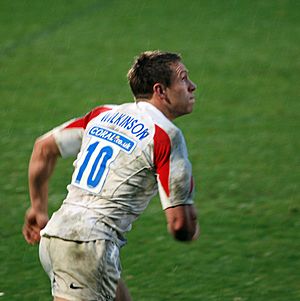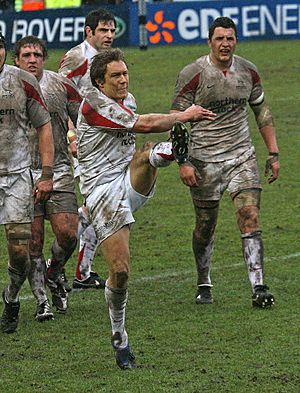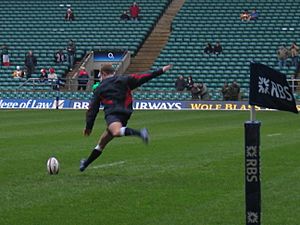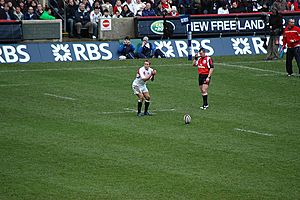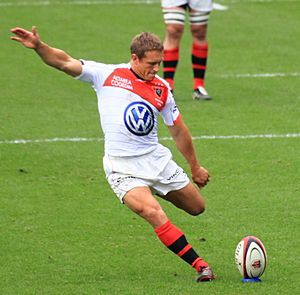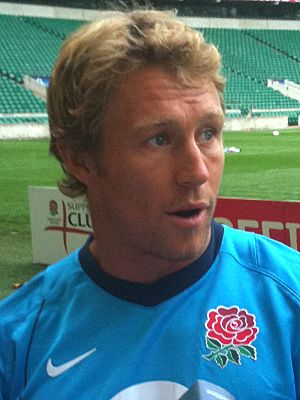Jonny Wilkinson facts for kids
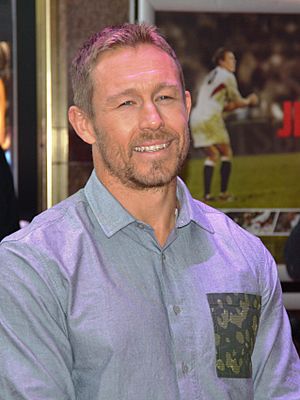
Wilkinson in September 2015
|
|||||||||||||||||||||||||||||||||||||||||||||||||
| Birth name | Jonathan Peter Wilkinson | ||||||||||||||||||||||||||||||||||||||||||||||||
|---|---|---|---|---|---|---|---|---|---|---|---|---|---|---|---|---|---|---|---|---|---|---|---|---|---|---|---|---|---|---|---|---|---|---|---|---|---|---|---|---|---|---|---|---|---|---|---|---|---|
| Date of birth | 25 May 1979 | ||||||||||||||||||||||||||||||||||||||||||||||||
| Place of birth | Frimley, England | ||||||||||||||||||||||||||||||||||||||||||||||||
| Height | 5 ft 10 in (1.78 m) | ||||||||||||||||||||||||||||||||||||||||||||||||
| Weight | 196 lb; 14 st 0 lb (89 kg) | ||||||||||||||||||||||||||||||||||||||||||||||||
| School | Lord Wandsworth College | ||||||||||||||||||||||||||||||||||||||||||||||||
| Rugby union career | |||||||||||||||||||||||||||||||||||||||||||||||||
|
|||||||||||||||||||||||||||||||||||||||||||||||||
| Official website | |||||||||||||||||||||||||||||||||||||||||||||||||
| http://www.jonnywilkinson.com | |||||||||||||||||||||||||||||||||||||||||||||||||
Jonathan Peter Wilkinson (born 25 May 1979) is a famous English former rugby union player. He was a fly-half, which is a key position in rugby. Jonny played for the Newcastle Falcons in England and the French team Toulon. He also played for the England national team and the British & Irish Lions.
Jonny Wilkinson is best known for scoring the winning drop goal in the 2003 Rugby World Cup Final. This amazing moment helped England win the World Cup! Many people think he is one of the greatest rugby players ever.
He played for the Newcastle Falcons for twelve seasons. In 2009, he moved to Toulon in France. There, he helped his team win two Heineken Cups and one Top 14 championship. He scored the most points for both of these clubs.
Wilkinson played 91 games for England. He was a very important part of the England team that won the 2003 World Cup. He scored the winning drop goal right at the end of the final game against Australia. Even after many injuries, he helped England reach the final of the 2007 World Cup. He also played for the British & Irish Lions twice, in 2001 and 2005.
He stopped playing rugby at the end of the 2013–14 season. In 2016, he was added to the World Rugby Hall of Fame. Today, Jonny works as a rugby expert for ITV Sport, sharing his knowledge during big rugby events.
Contents
Early Life and Rugby Beginnings
Jonny Wilkinson was born on 25 May 1979 in Frimley, Surrey, England. He grew up in Farnham. He went to Pierrepont School and Lord Wandsworth College. He started playing rugby at a young age for Farnham Rugby Club.
He was accepted into the University of Durham. However, he decided to become a professional rugby player in 1997. He joined the Newcastle Falcons team.
Playing Career Highlights
Starting Strong: 1998–2000
Jonny began his career at Newcastle as an inside centre. He soon became a regular player for the team. They won the 1997-98 Allied Dunbar Premiership title. By March 1998, he was part of the England national team. He made his first international appearance at just 18 years old.
He played in a tough tour in June 1998, where England faced strong teams like New Zealand and Australia. Back at his club, he took over as the main fly-half and goal kicker for the Falcons. He became a key player for England, starting in all their matches in the 1999 Five Nations Championship.
Jonny played for England in the 1999 Rugby World Cup. He scored a lot of points in his first World Cup game against Italy. England did well in the group stages. However, they lost in the quarter-finals to South Africa.
In 2000, Wilkinson played in all five matches of the 2000 Six Nations Championship. England won the championship that year. He also toured South Africa with England, scoring all the points in one important win.
Success and Challenges: 2001–2002
In 2001, England won the 2001 Six Nations Championship again. Jonny set a new record for individual points scored in a Six Nations game with 35 points against Italy. The Falcons also won the Powergen Cup that year.
Jonny was chosen as the main fly-half for the 2001 British Lions tour to Australia. The Lions won the first game against Australia. However, they lost the second game, where Jonny got injured. He recovered quickly for the final game.
England continued to play well in 2001 and 2002. They beat Australia and South Africa in tough matches. In a game against South Africa in 2002, Jonny had to leave the field with a dislocated shoulder. Some believed he was targeted by the opposing team.
World Cup Glory: 2003
The 2003 Six Nations Championship started with a big win for England against France. England then beat Wales, Italy, and Scotland. Jonny was even captain for the first time against Italy. England won the championship and the Grand Slam by beating Ireland in the final game. Jonny was named the best player of the match.
Before the World Cup, England toured the Southern Hemisphere. They beat New Zealand and Australia on their home ground, which was a huge achievement. This made England one of the top teams for the 2003 Rugby World Cup.
In the World Cup, England won their group games. Jonny scored many points against South Africa. In the quarter-finals, England beat Wales. Then, they defeated France in the semi-finals, with Jonny scoring all of England's points.
The final was against Australia. The score was tied at 17-17 in extra time. With only 26 seconds left, Jonny Wilkinson kicked a drop goal! England won 20-17, securing their first ever Rugby World Cup title. Jonny was the top point scorer of the tournament. He was also named the BBC Sports Personality of the Year and the IRB International Player of the Year.
Battling Injuries: 2004–2007
After the World Cup, Jonny faced many injuries. He missed the 2004 Six Nations Championship and other important games due to shoulder, arm, and knee problems. He was named England captain in October 2004, but injuries kept him from playing.
He returned to play for the 2005 British & Irish Lions tour to New Zealand. He scored points in the first game against Argentina, which ended in a draw. He played in the first two test matches against New Zealand but got injured again.
His injuries continued through 2006. However, he worked hard to recover. In January 2007, he made a strong comeback for Newcastle. He was then selected for England's 2007 Six Nations Championship opener against Scotland. He scored an amazing 27 points in that game, helping England win and earning him the Man of the Match award.
In the next game against Italy, Jonny became the highest individual point scorer in the history of the Five/Six Nations. Despite more small injuries, he played in the warm-up games for the 2007 World Cup.
2007 World Cup Journey
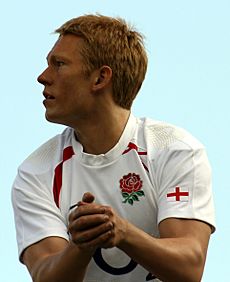
An ankle injury meant Jonny missed the first two games of the 2007 Rugby World Cup. But he returned to score 24 points against Samoa. He helped England reach the quarter-finals. In the quarter-final win against Australia, he scored all of England's points. He also became the Rugby World Cup's leading point scorer.
He continued to be crucial in the semi-final against France, kicking a long drop goal to secure England's victory. In the 2007 Rugby World Cup Final, England lost to South Africa. Jonny kicked two penalties in that game. He was one of only four players to play in both the 2003 and 2007 World Cup Finals.
Later International Career: 2008–2011
Jonny was England's main fly-half for the 2008 Six Nations Championship. He scored 50 points, making him the tournament's top scorer. However, he faced more injuries, including a dislocated knee, which kept him out for a long time.
In May 2009, he left the Newcastle Falcons after 12 years to join the French team Toulon.
He made a successful return to international rugby in November 2009 after an 18-month break. He played in games against Australia, Argentina, and New Zealand.
Jonny's international career was often interrupted by injuries. He didn't play for England for 1,169 days after the 2003 World Cup win. But when he returned in 2007, he scored a record 27 points against Scotland.
In a 2008 Six Nations match, he became the first English player to score 1,000 Test points. He also holds the world record for the most drop goals in international rugby, with 36. In March 2008, he became the highest international point-scorer overall, passing Neil Jenkins of Wales.
He briefly regained the record for the highest international points tally in 2011. On 12 December 2011, he announced he was retiring from playing for England.
Toulon Success: 2009–2014
Jonny joined Toulon in France in May 2009. He quickly became a star player there.
In April 2013, he scored all 21 points for Toulon in their Heineken Cup Quarter-Final win. In May 2013, he scored 11 points as Toulon won the 2013 Heineken Cup Final. He was named the ERC European Player of the Year for that tournament.
On 24 May 2014, he led Toulon to another 2014 Heineken Cup Final victory. Just one week later, on 31 May 2014, he led Toulon to win the Top 14 Final. This was the very last match of his career. After the game, fans from both teams sang "God Save the Queen" to honor him.
Jonny was a great leader for Toulon. He was known for working harder than anyone else and being very humble. He would give team talks in both French and English.
Retirement from Rugby
In May 2014, Jonny Wilkinson announced that he would retire from all rugby at the end of the season.
International Records and Achievements
England won 67 of the 91 games Jonny Wilkinson played in. He holds the record for the most Test drop goals, with 36.
He also holds the Rugby World Cup points record with 277 points. As of 2015, he had made more tackles in World Cups than any other back (a player in the back half of the field).
Honours and Awards
Jonny Wilkinson has received many honors:
- In 2002, he was made a Member of the Order of the British Empire (MBE).
- In 2004, he was promoted to Officer of the Order of the British Empire (OBE).
- In 2015, he was promoted to Commander of the Order of the British Empire (CBE) for his services to Rugby Union.
In 2009, he received an honorary doctorate from the University of Surrey. In 2016, he was inducted into the World Rugby Hall of Fame.
Team Honours
- Premiership: 1997–98
- Powergen Cup: 2001, 2004
- Toulon
- Heineken Cup: 2012–13, 2013–14
- Top 14: 2013–14
- Six Nations Championship:
- Winner (4): 2000, 2001, 2003, 2011
- Grand Slam:
- Winner (1): 2003
- Triple Crown:
- Winner (3): 1998, 2002, 2003
- World Cup:
- Winner (1): 2003
Statistics
International Tries
| Jonny Wilkinson's International Tries | ||||||
|---|---|---|---|---|---|---|
| Try | Opponent | City/Country | Venue | Competition | Year | |
| [1] | London, England | Twickenham | Rugby World Cup | 1999 | ||
| [2] | London, England | Twickenham | Six Nations | 2001 | ||
| [3]* | Sydney, Australia | Stadium Australia | Test match | 2001 | ||
| [4] | London, England | Twickenham | Six Nations | 2002 | ||
| [5] | London, England | Twickenham | Six Nations | 2002 | ||
| [6] | London, England | Twickenham | Test match | 2002 | ||
| [7] | London, England | Twickenham | Six Nations | 2007 | ||
| *Try number three was scored while playing for the British & Irish Lions | ||||||
International Analysis by Opposition
| Against | Played | Won | Lost | Drawn | Tries | Points | % Won |
|---|---|---|---|---|---|---|---|
|
|
|
|
|
|
|
|
|
|
|
|
|
|
|
|
|
|
|
|
|
|
|
|
|
|
|
|
|
|
|
|
|
|
|
|
|
|
|
|
|
|
|
|
|
|
|
|
|
|
|
|
|
|
|
|
|
|
|
|
|
|
|
|
|
|
|
|
|
|
|
|
|
|
|
|
|
|
|
|
|
|
|
|
|
|
|
|
|
|
|
|
|
|
|
|
|
|
|
|
|
|
|
|
|
|
|
|
|
|
|
|
|
|
|
|
|
|
|
|
|
|
|
|
|
|
|
|
|
|
|
|
|
|
|
|
|
|
|
|
|
|
|
|
| Total | 97 | 67 | 28 | 2 | 7 | 1246 | 69.07 |
| *Includes matches played with the British & Irish Lions | |||||||
Media and Books
Jonny Wilkinson used to write a column for The Times newspaper. He also wrote five books about his rugby journey and life.
- His first book, Lions and Falcons: My Diary of a Remarkable Year, was published in 2001. It covered a busy year for him in rugby.
- After the 2003 World Cup win, he released My World in 2004. This book focused on his World Cup experience.
- In 2005, How to Play Rugby My Way was published. This book was a guide for playing rugby, with tips and techniques.
- His fourth book, Tackling Life, came out in 2008. It talked about how his mindset changed after his many injuries.
- His autobiography, Jonny: My Autobiography, was published in 2011.
Since retiring, Jonny has become a rugby expert on TV for Sky Sports and ITV Sport. He shares his insights on major rugby tournaments.
Coaches and Mentors
Steve Black, the fitness trainer for Newcastle Falcons, was very important to Jonny's career. Jonny has said that Black taught him a lot about "values and ethics." He also worked with a kicking coach named Dave Alred.
Mental Approach
Jonny Wilkinson has spoken openly about how he managed the stress of his playing career. He used ideas from Buddhist teachings to help him control his desire for everything to be perfect. He tries to live thoughtfully and connect with others.
Personal Life
Family and Marriage
Jonny's older brother, Mark, also played rugby for Newcastle. His father, Phil, played rugby and cricket, and his mother, Philippa, played squash.
In October 2013, Jonny married his girlfriend, Shelley Jenkins, in a private ceremony in France.
Businesses
In 2011, Jonny launched Fineside, a men's fashion brand. In 2018, he started a kombucha company called No.1 Living. He began brewing kombucha at home and found it helpful for a healthy diet.
Awards and Recognition
In December 2005, Jonny received an honorary doctorate from Northumbria University. He was named the 2003 BBC Sports Personality of the Year. He also won the 2003 International Rugby Board (IRB) International Player of the Year award and the 2013 (ERC) European Player of the Year award.
See also
 In Spanish: Jonny Wilkinson para niños
In Spanish: Jonny Wilkinson para niños
- List of top English points scorers and try scorers
- List of leading rugby union test point scorers
 | Victor J. Glover |
 | Yvonne Cagle |
 | Jeanette Epps |
 | Bernard A. Harris Jr. |


